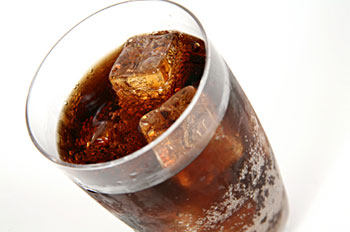More Health and Nutrition Bites
Related
What The American Beverage Association wants you to think
When I am asked to speak or give an interview about health, diet, and nutrition, I am very careful to make it clear that I am an evidence-based physician. In the last thirty-plus years there has been an explosion of high quality research into diet and nutrition, and when I say "high quality research" I mean that it is well-designed, of an appropriate size, funded by disinterested parties, and published in a reputable, peer-reviewed medical journal.
Another Reason to Avoid Sugary Drinks: Your Blood Pressure
Drinking sugar-sweetened beverages such as soda, lemonade, sweetened fruit drinks and punches has been shown to be linked to obesity, leading to diabetes and heart disease. Being overweight is also linked to high blood pressure, which can also lead to heart disease, as well as stroke, kidney disease and a higher risk of death from all causes - which means a shorter life expectancy.
Sugary Beverages and Your Health
I've been saying for years that folks should avoid drinking soda if only because of the extra calories. In the last few years a fair bit of research has been done on sugar-sweetened beverages and their contribution not only to weight gain but also conditions such as Metabolic Syndrome, gout, heart disease, high blood pressure and poor cholesterol scores.
Health & Nutrition Bites
Get the latest health and diet news - along with what you can do about it - sent to your Inbox once a week. Get Dr. Gourmet's Health and Nutrition Bites sent to you via email. Sign up now!
A clear link between sugary drinks and weight gain

Did you know that every man, woman, and child in the United States consumes 114 calories every day, on average, from sugar-sweetened beverages?
The manufacturers of sodas and other sugar-sweetened beverages would like you to believe that their products are not responsible for the global epidemic of obesity: after all, it's just a coincidence that the rise in worldwide consumption of their beverages began about the same time as the world's population started to increase around the middle. To that end, they'll tell you that to counteract all that sugar, all you have to do is exercise more, and that their diet drinks will actually help you lose weight.
They keep saying that because when people have researched the possible link between drinking sugar-sweetened beverages (SSBs) such as sodas, fruit juice drinks, flavored waters, and sports drinks, the outcomes have been mixed. Why? As you know if you're a longtime Dr. Gourmet reader, in medicine the Transitive Property of Equality doesn't necessarily apply: if A = B and B = C, that doesn't always mean that A = C. If people drink soda and gain weight, that doesn't necessarily mean that drinking soda causes the weight gain.
Except when it does.
A team of European researchers noted that the results of previous review articles on SSBs and weight had been somewhat mixed (Obesity Facts 2017;10:674-693); further, no review articles had been published that looked at research published between 2013 and 2015. Accordingly, they searched the literature and identified 30 studies that examined the association between SSB consumption and body weight.
The articles they included in their review included research in adults and in children. The authors limited their review to prospective studies or randomized controlled trials, and made sure that the studies lasted a minimum of 6 months and were not funded by industry at all. In total, over 240,000 people were included in the studies.
The prospective studies in children lasted as long as 13 years, and 16 of the 17 studies in children showed a positive association between SSB consumption and body weight measures - more sugary drinks meant higher body weight, body fat, or waist circumference. Only 1 prospective study found no association. All 3 of the randomized controlled trials in children, however, showed a positive association: most striking was a randomized controlled trial that showed that each additional glass of soda per day meant an increase in the child's Body Mass Index of 0.11.
Prospective studies in adults lasted between 5 and 14 years, and all showed that greater intake of SSBs were associated with higher body weight. The one randomized controlled trial lasted only 9 months and showed no clinically significant difference between the control group and the intervention group. That said, the trial was aimed at getting women to reduce their SSB consumption with education alone (the control group) or education combined with free bottled drinking water (the intervention group). Both groups lost weight, with the difference in weight lost between the two groups not being clinically significant.
What this means for you
The preponderance of clinically relevant evidence (that is, high quality studies not funded by the beverage industry) is quite clear: drinking sugar-sweetened beverages more than as an occasional treat will lead to weight gain. Drink water or coffee or tea with minimal sweeteners instead.
First posted: January 10, 2018
